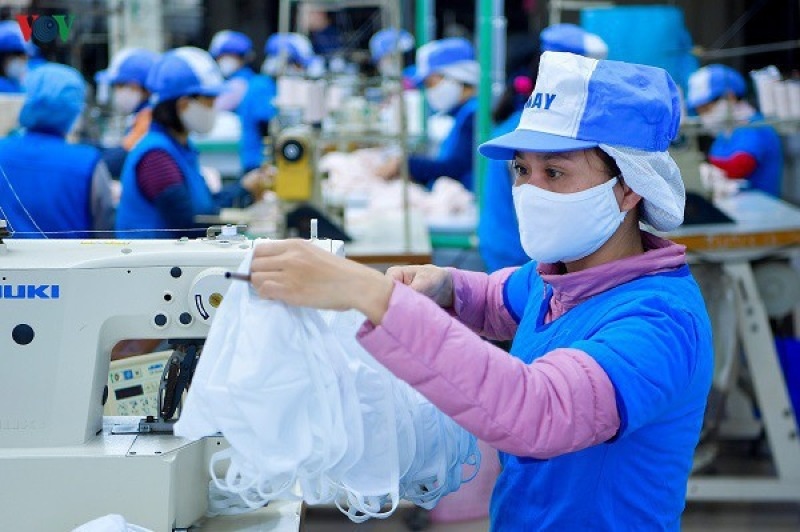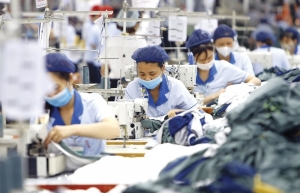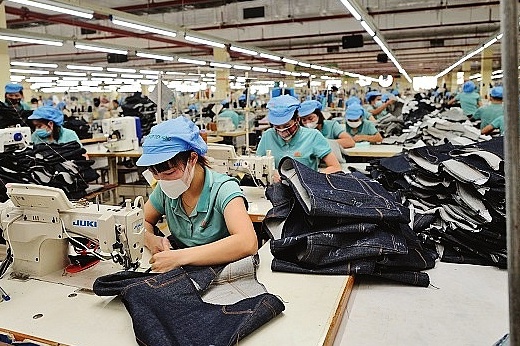Lifelong learning and better adaptability: key to job transition
At the event, Nguyen Hoang Ha, programme officer at the International Labour Organization in Vietnam, said that swift and complex fluctuations across the board were affecting Vietnam’s rebound and development efforts, particularly regarding investment, trade and finance, monetary, and job opportunities.
The labour market involving manufacturing industries is fraught with mounting hardships amid economic recession. Workers being laid off is happening in many businesses, yet in the opposite direction, many businesses cannot recruit skilled workers.
The key to this situation, according to Ha, lies in the skill, capacity and adaptability of workers.
 |
| Nguyen Hoang Ha, programme officer at ILO in Vietnam |
“We need to pay more attention to this issue in the medium and long term. If workers lose their jobs, aside from ensuring social wellbeing, it is essential for relevant state management agencies, such as employment service centres or training facilities to support workers to be trained, retrained and improve their skills, thus enhancing their ability to find better jobs,” Ha said.
In a study conducted more than a year ago by the Vietnam Chamber of Commerce and Industry (VCCI), at a certain stage, it was imperative for business leaders to transform the way businesses develop and operate, and this mandates a better overall strategy, and requires more specialised skills for the workforce.
“For example, for the textile apparel industry by that time, workers must be able to operate production lines applying digital technology. They would have sufficient qualifications and capacity to manage a series of industrial machines buoyed by digital technology. Particularly, digital transformation for industries such as textile, apparel and footwear is essential at that time,” Ha noted.
Statistics show that in the first quarter of 2023, Vietnam had about 52.2 million workers aged 15 and above, up more than one million compared to 2022.
The young workforce is enormous and has great potential. However, in light of the project "Raising skills for Vietnamese workers to 2030," the General Directorate of Vocational Education and Training said that the Vietnamese workforce had yet to meet the requirements of several businesses, particularly foreign invested enterprises.
 |
Meanwhile, trained workers account for just 26 per cent, which is very low compared to practical requirements. Certificates are, however, just one issue, what is more important is actual labour skills.
“From the perspective of the International Labor Organization, we see that Vietnam needs to give priority to skills training for its workers. We need to change the approach towards lifelong learning, not only learning in a certain period, along with having a progressive attitude, but regularly updating the requirements of socioeconomic life,” Ha said.
In addition, it is also necessary to pay due heed to skill improvements of vulnerable groups, typically female workers.
“Only with constant learning, skill improvement and enhanced adaptability can workers cope with the very fast and powerful changes of the economy, seizing the opportunities to switch to other industries. To do this, besides the attention and support of businesses and organisations, the consciousness and efforts of workers themselves is extremely important and decisive,” Ha said
 | The transition to a sustainable food system In response to the climate emergency that is exacerbating the global food crisis, companies like Nestlé are making efforts to play a role of game-changers. Chris Hogg, Nestlé’s vice president and head of Sustainability and Communications for Asia, Oceania, and Africa, talked with Van Trang about the transition to a regenerative food system that can nourish the planet affordably and sustainably amid new crisis contexts. |
 | Authorities step up to avert more job losses Amid enterprises facing increased woes undermining economic growth, the government has been recommended to take prompt solutions to prevent growing unemployment. |
 | 70,000 garment and textiles job cuts since January According to a report of the Ministry of Labour, Invalids and Social Affairs (MoLISA) released on June 5, workers in the garment and textile sector suffered the most from a series of job cuts in the first five months of this year, with 70,000 workers losing their jobs and 66,600 having their working hours reduced. |
 | VBF asks for digitalisation of learning (Education 4.0) To encourage the continued development of Vietnam's economy, the upskilling and education of its future labour force is essential. |
What the stars mean:
★ Poor ★ ★ Promising ★★★ Good ★★★★ Very good ★★★★★ Exceptional
Related Contents
Latest News
More News
- Nestlé Vietnam's Lunar New Year campaign reframes how Tet is counted (January 28, 2026 | 11:40)
- Tet event in Japan celebrates success of 14th National Party Congress (January 25, 2026 | 10:04)
- 14th National Party Congress wraps up with success (January 25, 2026 | 09:49)
- Congratulations from VFF Central Committee's int’l partners to 14th National Party Congress (January 25, 2026 | 09:46)
- List of newly-elected members of 14th Political Bureau announced (January 23, 2026 | 16:27)
- 14th Party Central Committee unanimously elects To Lam as General Secretary (January 23, 2026 | 16:22)
- List of members of 14th Party Central Committee announced (January 23, 2026 | 09:12)
- Highlights of fourth working day of 14th National Party Congress (January 23, 2026 | 09:06)
- Press provides timely, accurate coverage of 14th National Party Congress (January 22, 2026 | 09:49)
- Press release on second working day of 14th National Party Congress (January 22, 2026 | 09:19)

 Tag:
Tag:


























 Mobile Version
Mobile Version